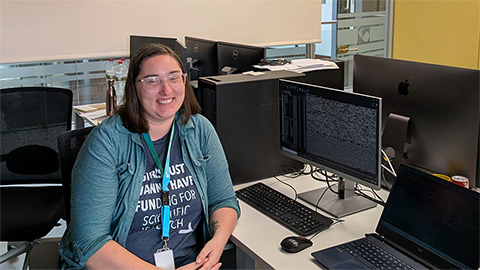An ion channel connection
Years ago as an assistant professor just starting my own lab, I was investigating Ser/Thr protein phosphatases that acted on sodium channels.
At a Society for Neuroscience meeting, a close colleague from my former postdoc lab suggested I view a poster by David Armstrong, a highly accomplished electrophysiologist. His work described regulation of a potassium channel by a phosphatase with similar properties to one that I was chasing. I got very excited and told David all the ideas his work suggested to me. He kindly suggested that I obtain his cell line from him and do the experiments I wished to do. I agreed and left.
Later, David dined with a friend of yet another old postdoc colleague of mine. That friend encouraged him to take me more seriously, and the next day he looked me up and offered to collaborate more closely, as he understood our skills were complementary.
David and I continued to collaborate until he recently retired from his position at the National Institute of Environmental Health Sciences. In addition to research, we co-edited a book on ion channels and initiated a Federation of American Societies for Experimental Biology conference devoted to ion channels.
David has been the most wonderful and generous collaborator and mentor over all these years. The thing I enjoyed most was that he would call out of the blue with outrageous ideas — he made me laugh like crazy and think hard outside the box. Some of those ideas turned out to be real. It was always fun and intellectually stimulating to do science with David.
Incidentally, as often occurs in science, the enzyme we both thought we were chasing was not correct — it turned out to be a new phosphatase family member, which made our journey that much more fun and exciting.
Like Experimental Biology meetings, Society for Neuroscience meetings are huge, and you never know what connections you can make. I have my good friends from my postdoc years to thank for this long-lived collaboration, and I try my best to pay it forward to young scientists in my own sphere of influence.
The lesson of this story is that science never happens in a vacuum — go out and tell your science story, make friends and have fun doing science together. It’s vastly more enriching that way.
MEETING CONNECTIONS
Have you made a friendship or connection, forged a collaboration, gleaned insight or had another meaningful experience at a scientific meeting?
To celebrate the return of the American Society of Biochemistry and Molecular Biology’s annual meeting as an in-person event, ASBMB Today held an essay contest based on this question. This is one of the winning entries.
Enjoy reading ASBMB Today?
Become a member to receive the print edition four times a year and the digital edition monthly.
Learn moreGet the latest from ASBMB Today
Enter your email address, and we’ll send you a weekly email with recent articles, interviews and more.
Latest in Opinions
Opinions highlights or most popular articles

Women’s health cannot leave rare diseases behind
A physician living with lymphangioleiomyomatosis and a basic scientist explain why patient-driven, trial-ready research is essential to turning momentum into meaningful progress.

Making my spicy brain work for me
Researcher Reid Blanchett reflects on her journey navigating mental health struggles through graduate school. She found a new path in bioinformatics, proving that science can be flexible, forgiving and full of second chances.

The tortoise wins: How slowing down saved my Ph.D.
Graduate student Amy Bounds reflects on how slowing down in the lab not only improved her relationship with work but also made her a more productive scientist.

How pediatric cataracts shaped my scientific journey
Undergraduate student Grace Jones shares how she transformed her childhood cataract diagnosis into a scientific purpose. She explores how biochemistry can bring a clearer vision to others, and how personal history can shape discovery.

Debugging my code and teaching with ChatGPT
AI tools like ChatGPT have changed the way an assistant professor teaches and does research. But, he asserts that real growth still comes from struggle, and educators must help students use AI wisely — as scaffolds, not shortcuts.

AI in the lab: The power of smarter questions
An assistant professor discusses AI's evolution from a buzzword to a trusted research partner. It helps streamline reviews, troubleshoot code, save time and spark ideas, but its success relies on combining AI with expertise and critical thinking.

